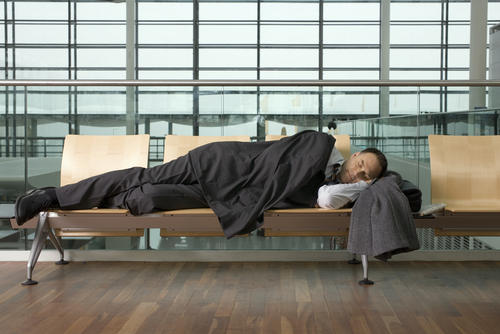It’s only 10 a.m. in your hotel room but you can’t stop yawning. As you take your hand to your mouth a quick glimpse at your watch reminds you that back home it’s, well, 4 a.m.
Jet lag disrupts your body’s internal clock, the “circadian clock.” Taking natural daylight and other factors as a cue, the circadian clock tells your body when to wake up and when to go to sleep. It influences your alertness, concentration, muscle strength, body coordination, and mood.
According to our circadian clock, we are most alert in the late morning and late afternoon. By contrast, we are most sleepy between 3-5 a.m. and 3-5 p.m. But when you travel through different time zones, your internal clock loses its sync.
For example, if you leave New York at 6 p.m. and land in Berlin at 9 a.m., your circadian clock will think it’s 3 a.m. So that, by the time you get to your hotel room, you may feel an overwhelming need to sleep, just when the rest of Berlin gets ready for a new day.
In addition to the disruption in the circadian rhythm, another factor that may contribute to jet lag is the cabin pressure in the plane. Because the cabin is pressurized not to sea level but 6,000-8,000 feet above, which is probably much higher than where you live, less oxygen reaches your bloodstream and you feel lethargic. The reduced humidity in the plane may also contribute to the symptoms of jet lag, by causing dehydration which can increase your tiredness.
The Effects of Jet Lag
Jet lag has wide-ranging effects. You may experience all of them or only some. Crossing multiple time zones usually worsens them.
- Tiredness and fatigue, usually mild to moderate but can be severe after particularly long flights
- Drowsiness, lethargy, and sleepiness
- Disorientation or confusion, which can be especially unpleasant when you are in unfamiliar surroundings
- Gastrointestinal issues such as an upset stomach
- Irritability or bad mood
- Difficulties concentrating
- Difficulties following a conversation
- Insomnia
Jet lag symptoms usually last until your circadian clock sync with the new time zone, that is, usually up to 24 hours after the time zone change. But depending on the quality of your sleep and your level of stress, these symptoms may last longer.
Unfortunately, jet lag is not something you can get used to. On the contrary, frequent fliers such as business travelers and flight attendants experience jet lag more often. Experiencing jet lag constantly may have a long-term effect on your health. It may disrupt your sleep patterns and, by implication, affect your immune system and your cognitive performance, and make you more prone to insomnia and depression.
Jet lag then is not just an unpleasant state of mind, but an actual imbalance in your biological clock. It can be serious enough to have a lasting effect on your actions. For example, scheduling an important business meeting before sleeping off your jet lag may not be a good idea. You may not be able to concentrate or communicate your thoughts effectively. The real costs of jet lag then may extend well beyond your health.
More than affecting your health, jet lag can endanger your life. Drowsy driving as a result of jet lag could increase your risk of suffering an accident.
Dealing with Jet Lag
So, what can you do to relieve the effects of jet lag and sync your circadian clock to the new time zone more quickly? The first step is to prepare your body in the days preceding the flight. If you are traveling east, try to go to bed earlier. If you are flying west, try to stay up a bit longer, but not too long. In this way, you can accustom your body to the new time zone and lessen the impact of jet lag on your health.
There are a couple of other things you can do:
- Choose a flight that lands in the evening when possible. After arrival, don’t stay up late but try to get some sleep. To fall asleep more easily, consider taking a natural supplement that helps induce sleep, such as certain herbal teas. You may also want to avoid heavy meals.
- Get some shine. Sunlight will help regulate your body’s circadian clock. If your plane lands while the sun is still up, you may want to take a quick stroll in the sun or have a light drink (no caffeine) out on a terrace before checking in. If not, make sure to get some shine the following day.
- Light therapy. Artificial light provided by lamps or lighted boxes can help keep you awake after you reach your destination and resist the initial drowsiness and sleepiness caused by jet lag. You can then fall asleep at the right time to make it easier for your body to adjust to the new time zone. But if you are sensitive to light, remember that blue light can keep you awake beyond your regular sleep hours, so you may want to avoid watching TV or using your phone late into the night.
- Take melatonin. Melatonin helps to regulate your circadian rhythm. A natural hormone, melatonin gets released in your body just before sleep. By taking it as a supplement half an hour before going to bed, you help your body fall asleep more easily.
But what about sleeping pills? Are they any good for jet lag? Before taking sleeping pills it’s good to know that they may cause addiction. Also, their effect on the circadian rhythm remains unclear. To improve the quality of your sleep, use instead relaxation techniques and natural sleeping aids.
Depending on how many time zones you cross, the effects of jet lag may be mild or more severe. However, with a bit of planning and the right relaxation strategies, you can sync your circadian clock to the new time zone more easily.
But remember that jet lag is not just a feeling of tiredness after a long flight, but a medical condition. Its costs on your health can be serious. Rather than dealing with the effects of jet lag, plan your travels so that you avoid jet lag as much as possible.










